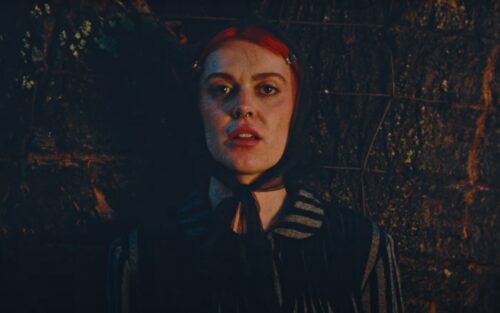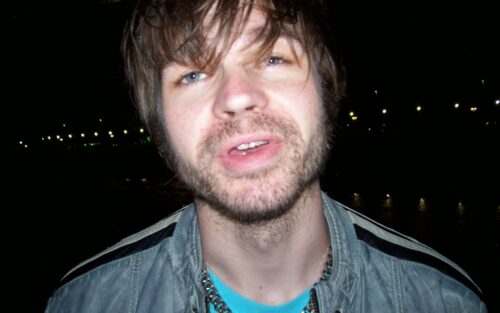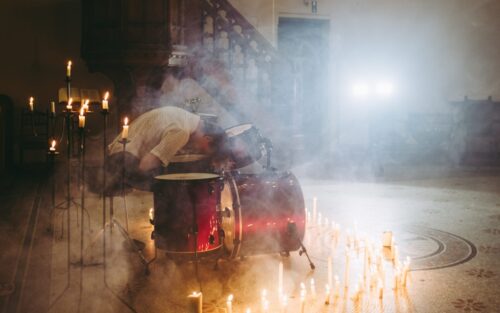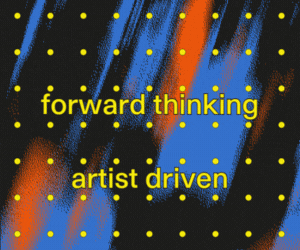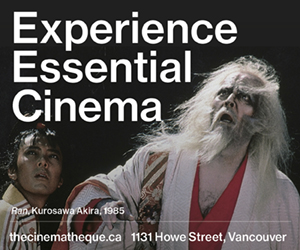Otoboke Beaver: Kyoto’s Noise Icons Won’t Be Tamed
Guitarist Yoyoyoshie (よよよしえ) discusses leaving the underground and the band’s place in Japan’s experimental realm.
By Khagan Aslanov
Photo by Takeaki Emori
- Published on
For some years now, Kyoto punk band Otoboke Beaver have been blazing and resecting their way through the world on a long, performative tour of their raucous, turbulent, and eccentric songs. The group has become something of a people’s champion, packing an exhilarating mix of ire, boldness, and relatability into their loud, smirking stories of women—and humans generally—coping with daily life.
At this year’s Sled Island Music Festival in Calgary, RANGE sat down with the band’s guitarist Yoyoyoshie to talk about bursting back to life after a pandemic-induced hibernation, finding recognition abroad, and becoming one of the most sought-after live acts today. Bianca Dayrit, the festival’s Fund Development Manager, was kind enough to facilitate the interview by translating between me and Yoshie.
Unlike most bands that write melodies and skeletal structures first and then fit lyrics to that mold—or bands that write in unison by jamming—Otoboke Beaver build their arrangements around singer Accorinrin’s words. Having to fit music to readymade lyrics is part of what forges the band’s chaotic, shape-shifting brand of noise, where tempo, time signatures, and pitch exist in a purely abstract space, ready to mutate, invert, or collapse at any moment.
Aside from their volcanic, spirited sound, the band has become a beacon of feminism—though one that has often been racked with misinterpretations and mistranslations of intent. Various publications have quoted them as rejecting the label of “feminist,” or suggested that touring the West made them eventually embrace it, or that they were simply thrashing against Japan’s perception of feminists as “overloud women.” But when I ask for clarification, Yoshie’s answer is simple:
“Nothing really changed with how we felt. We were living these lives and these thoughts before. There was no big revelation.”


One thing that has always remained unambiguous is Otoboke Beaver’s willingness to confront their home country’s approach to outspoken women. On more than one occasion, they have written songs specifically to address Japan’s gelid response to the band, particularly among men:
“On ‘Dirty Old Fart is Waiting for My Reaction,’ we address Japan’s old men criticizing us for speaking about men’s behaviour.”
It may seem strange that the band sometimes feels more acknowledged abroad than at home. It’s natural to assume that a country like Japan—with such a robust, generations-spanning noise scene—would be more accepting of that culture. But often, a thriving niche scene becomes so strong precisely because of adversity and obscurity. Despite luminaries like Keiji Haino carving out a wide-open space for experimental outbursts, the field still sits just below the surface of the general public’s awareness.

Otoboke Beaver performing at Sled Island Music Festival 2025 (Photo: Sebastian Buzzalino)
“We are not famous in Japan. We are still an underground band there. We are happy that people around the world accept our music. We just love to play, but of course, it’s a little sad that we aren’t more popular at home,” Yoshie says.
The quartet now has a string of EPs and two full-length albums to their name, with fans waiting for another release with bated breath. But it’s their live show that has solidified Otoboke Beaver into such a formidable and coveted presence on festival rosters. There, the group’s love of Manzai truly comes to the forefront. The traditional Japanese comedic style relies on rapid interplay between humour and sternness, creating a word-packed, anarchic dynamic. That self-aware, fun-loving spirit has become a calling card for Otoboke Beaver, and being in the pit at their concerts means, by turns, laughing, bracing, dancing, cowering, and having your eardrums intermittently pulverized.
Like most acts whose recorded output and performances live on the perceptual fringe, a cult of personality has formed around Otoboke Beaver—one they, as with most things, humbly take in stride:
“Our daily lives are very casual. We are obviously not always this upset,” Yoshie laughs.
By Stephan Boissonneault
Nate Amos revisits a decade of stray ideas and turns them into his most compelling record yet.
By Khagan Aslanov
Mike Wallace’s electro-punk project premieres the hypnotic, percussion-driven video for "Certain Days."

